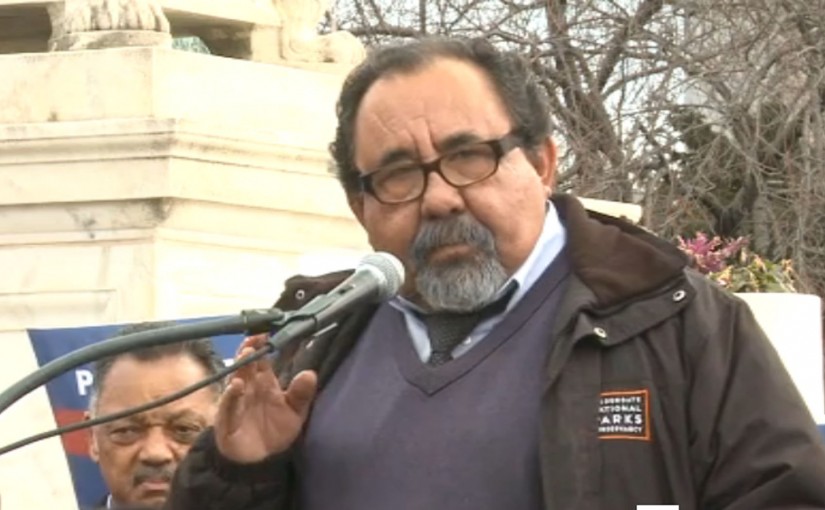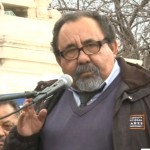Supreme Court Frees Arizona From Federal OK on Vote Laws

Cronkite News
WASHINGTON – Arizona will no longer have to get prior federal government approval for state voting changes, after the Supreme Court on Tuesday struck down a key component of the Voting Rights Act.
A sharply divided court said the part of the law that required nine states, including Arizona, to get advance permission for voting changes had outlived its need and that it unconstitutionally singled out some states for harsher treatment than others.
The ruling in Shelby v. Holder was welcomed by some Arizona officials who said the state will no longer be “humiliated” by having to ask “‘Mother, may I?’ to the federal government.”
“Decisions that affect states should be left to states,” Gov. Jan Brewer said in a prepared statement. “I am grateful to the high court for ruling on the side of sovereignty and federal restraint.”
But others called support for the ruling “shameful” and predicted that it “opens the door for greater levels of discrimination” against minority voters.
“Today the majority of the court washed its hands of evidence of discrimination,” said Rep. Raul Grijalva, D-Tucson. “That’s not going to sit well with millions of American who face disenfranchisement.”
Those arguments echoed in the 5-4 ruling by the Supreme Court.
Chief Justice John Roberts wrote for the majority that the “preclearance” requirement made sense in 1965, when it was applied to states with “evidence of actual voting discrimination” – a low voting rate and a history of laws and procedures to suppress minority registration.
But “things have changed dramatically,” he wrote, with large numbers of black office-holders in the South and parity in voting and voting registration between different groups. The Voting Rights Act restrictions were reauthorized in 2006 “as if nothing changed.”
“Coverage today is based on decades-old data and eradicated practices,” and can no longer be justified, he wrote.
But in a sharp dissent, Justice Ruth Bader Ginsburg said the majority ignored 15,000 pages of congressional testimony on the reauthorization that pointed to ongoing discrimination, proving that the law is still needed. She said any gains in voting rights are because of the preclearance requirement, and that overturning it would lead to “backsliding.”
“Throwing out preclearance when it has worked and is continuing to work to stop discriminatory changes is like throwing away your umbrella in a rainstorm because you are not getting wet,” she wrote.
The ruling did not overturn “the permanent, nationwide ban on racial discrimination in voting” and the court invited Congress to rework the criteria on which states have to get preclearance.
But by leaving it to Congress, the court “intentionally left it to a damaged institution to invent a new solution from scratch,” Grijalva said.
“This is a political decision that will undermine confidence in our electoral process,” Grijalva said. “In that sense, this ruling is a disaster waiting to happen.”
Nina Perales, an official with the Mexican American Legal Defense and Educational Fund, said the ruling ignored serious ongoing civil rights issues.
“Today’s decision has far-reaching effects for Latino voters,” Perales said. “(It) opens the door for greater levels of discrimination against Latino voters.”
But Arizona Attorney General Tom Horne welcomed the ruling, saying the law was never constructive but was burdensome for the state.
“The huge and expensive administrative burden of pre-clearance” was an unnecessary annoyance, Horne said. It “humiliates Arizona by making it say, ‘Mother, may I?’ to the federal government” to change “some remarkably minor laws.”
Horne said he is not worried about voter discrimination, noting that “people can still bring lawsuits … for any alleged discrimination” under the Voting Rights Act.
Brewer is also confident that Arizona has moved beyond voter discrimination.
“Even if Congress enacts a new statute, it is unlikely Arizona would be mandated to continue to seek federal approval for even the most routine changes to our election procedures,” she said.
But state Sen. Steve Gallardo, D-Phoenix, said the ruling is nothing to celebrate, and that he was “ashamed” by what he called Horne’s dismissal of the Voting Rights Act.
“It is shameful when politicians are celebrating a ruling that takes away rights from people of color,” Gallardo said, calling voting “a basic right.”
He rejected the argument that the law is outdated, agreeing with Ginsburg that it is because of preclearance that things are better.
“The court should not have stopped for those states that have shown improvement,” Gallardo said. He pointed to Arizona as the “poster child” for the argument that the law is still needed in some states.
“We continue to pass legislation that continues to hurt minorities,” he said. “Ten years ago our redistricting was struck down. Obviously we need federal oversight.”
Despite the court ruling, Grijalva, Gallardo and others vowed to continue fighting for voter parity.
“We’re calling on the people of this country to be more vigilant,” Gallardo said. “To see that Congress does what this country needs.”















